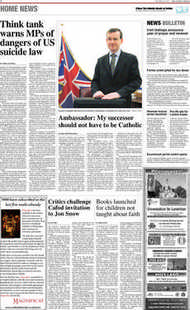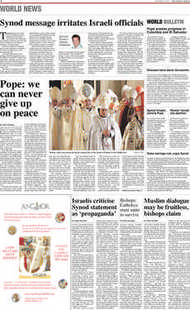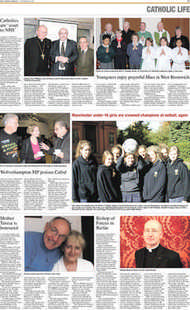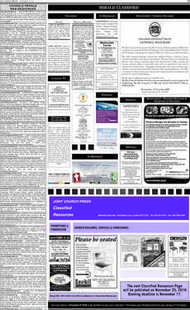Page 4, 29th October 2010
Page 4

Report an error
Noticed an error on this page?If you've noticed an error in this article please click here to report it.
Tags
Share
Related articles
Muslim Dialogue May Be Fruitless, Bishops Claim
Chinese Bishop Is Ordained By Pope
Stay In Holy Land, Benedict Xvi Tells Terrified Christians
Holy Land Faithful Must Have Courage, Says Pope
Pope Hails Unity Of German Orthodox
Pope: we can never give up on peace
BY CINDY WOODEN
POPE BENEDICT XVI has told bishops in a homily closing the Synod of Bishops for the Middle East that “we must never resign ourselves to the absence of peace”.
The Pope said in a Mass ending the two-week Synod: “Peace is possible. Peace is urgent.” He said it was peace that would stop Christians from emigrating.
Pope Benedict also urged Christians to promote respect for freedom of religion and conscience, “one of the fundamental human rights that each state should always respect”.
Synod members released a message to their own faithful, their government leaders, Catholics around the world, the international community and to all people of goodwill. The Vatican also released the 44 propositions adopted by Synod members as recommendations for Pope Benedict to consider in writing his PostSynodal Apostolic Exhortation.
Although the bishops said the main point of the Synod was to find pastoral responses to the challenges facing their people, they said the biggest challenges were caused by political and social injustice and war and conflict.
The bishops said: “We have taken account of the impact of the Israeli-Palestinian conflict on the whole region, especially on the Palestinians who are suffering the consequences of the Israeli occupation: the lack of freedom of movement, the wall of separation and the military checkpoints, the political prisoners, the demolition of homes, the disturbance of socio-economic life and the thousands of refugees.” They called for continued Catholic-Jewish dialogue, condemned anti-Semitism and anti-Judaism and affirmed Israel’s right to live at peace within its “internationally recognised borders”.
Although relations between Christians and Jews in the region are coloured by IsraeliPalestinian tensions, the bishops said the Catholic Church affirms the Old Testament – the Hebrew Scriptures – was the word of God and that God’s promises to the Jewish people, beginning with Abra ham, were still valid. But they said: “Recourse to theological and biblical positions which use the word of God to wrongly justify injustices is not acceptable. On the contrary, recourse to religion must lead every person to see the face of God in others.” The bishops expressed concern over the future of Jerusalem, particularly given Israeli “unilateral initiatives” that threatened the composition and demographic profile of the city through construction and buying up the property of Christians and other Arabs. They also offered words of support for the suffering Iraqi people, both Christians and Muslims, and for those forced to flee the country.
The Synod members said they talked extensively about Christian-Muslim relations and about the fact that they both were long-standing citizens of the same countries and should be working together for the good of all. “We say to our Muslim fellow citizens: we are brothers and sisters; God wishes us to be together, united by one faith in God and by the dual commandment of love of God and neighbour,” they said. But Christians must be given their full rights as citizens and the future peace and prosperity of the region require civil societies built “on the basis of citizenship, religious freedom and freedom of conscience”.
Throughout the Synod, members said that while religious freedom and freedom of worship were recognised in most of the region’s constitutions, freedom of conscience – particularly the freedom to change religion – was not respected in many places.
The Synod propositions called for educating Christians in the beliefs of their Muslim and Jewish neighbours and for strengthening dialogue that would help the region’s people “accept one another in spite of their differences, working to build a new society in which fanaticism and extremism have no place”.
Much of the Synod’s discussion focused on the emigration of Christians, and they praised those who had remained despite hardship and thanked them for their contributions to Church and society.
blog comments powered by Disqus





















